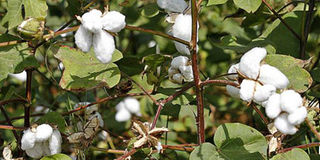Meeting focuses on cotton farming

What you need to know:
- Cotton inspection officer at the Tanzania Cotton Board (TCB) Buluma Kalidushi said among the resolutions were targeting to increase irrigation schemes, ensure availability of quality cotton seeds and improving extension services.
Mwanza. Cotton stakeholders have passed 15 resolutions including allocating 20 per cent of the crop levy from the current 10 per cent that will stimulate the development of the sub-sector.
Cotton, which is grown in 56 districts in 17 regions of Tanzania Mainland, is one of the strategic crops, to help transformation of the economy towards semi-industrialised middle income status by 2025.
The resolutions among other things are targeting to improve yields, which will automatically increase outputs and incomes for millions of farmers depending on the crop as their main source of livelihood.
During the 15th annual meeting held here yesterday, stakeholders agreed deliberately to implement all 15 resolutions for the betterment of the sub-sector, which is facing the problem of low yields due to lack of inputs and improved seeds.
Cotton inspection officer at the Tanzania Cotton Board (TCB) Buluma Kalidushi said among the resolutions were targeting to increase irrigation schemes, ensure availability of quality cotton seeds and improving extension services.
“TCB in collaboration with Cooperative Council will also collaborate to ensure that farmers are equipped with modern farming implements as well as reducing post-harvest losses,” he said.
Mr Kalidushi said stakeholders have also asked the Tropical Pesticides Research Institute (TPRI) to ensure that it improved system checks for the qualities of imported pesticides.
Other resolutions include improving physical infrastructure to attract apparel industries.
TCB director general Marco Mtunga said the crop value chain is estimated to benefit some 19 million people, which is nearly 40 per cent of the country’s population.
He mentioned other resolutions as consolidating primary cooperative societies, registering all cotton farmers, improving the sub-sector statistics; improve financing and boosts yields from currently 300 kilos per acre to at least a ton (1,000 kilos).
According to Mtunga, various institutions include Vocational Education Training Authority (Veta), Carmatec, Small Industries Development Organisation (Sido), Tanzania Industrial Research Development Organisation and Temdo to invent planting and weeding machines.



